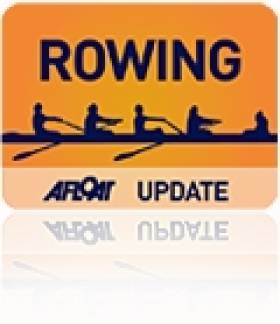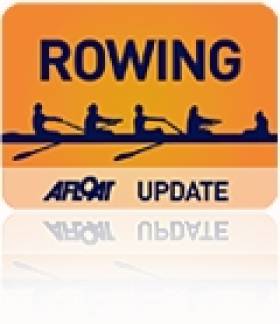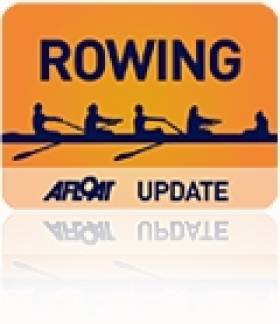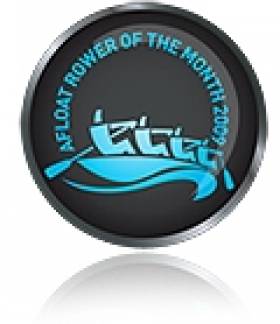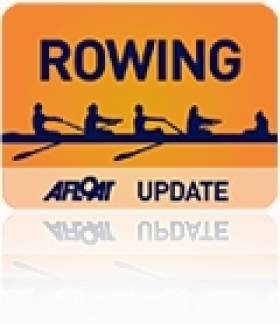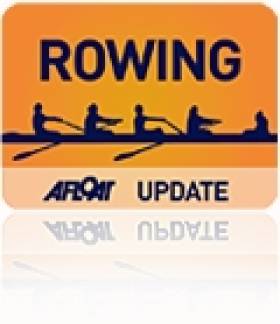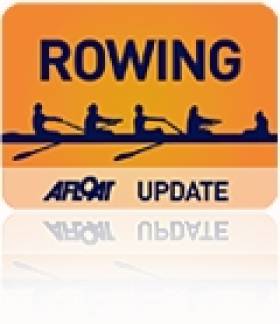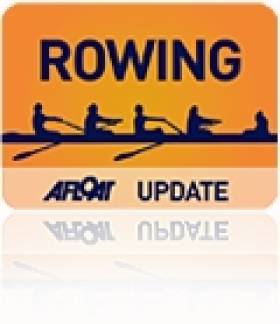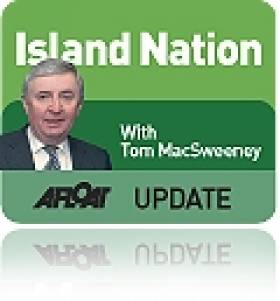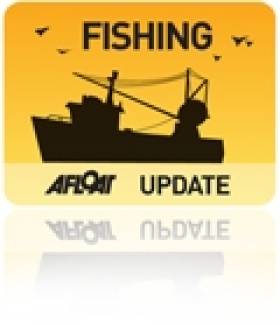Displaying items by tag: Skibbereen
Trinity are Senior Eights Champions of Ireland
#ROWING: Trinity won the senior eights Championship of Ireland for the first time since 2008 at the National Rowing Centre today. They started well and pushed into a one-length lead at 1,000 metres over UCD/Old Collegians, with NUIG/Grainne Mhaol not far behind. Trinity saw off repeated pushes to win by just under a length from UCD/Old Collegians.
In the women’s senior eights UCD had a similar race pattern, but had a little more to spare over their rivals, UCC/Skibbereen and Trinity.
The men’s intermediate double gave Garda’s Damien Kelly and Ronan Allen a chance to impress. They dominated their race, as did Skibbereen in the women’s junior quadruple sculls – a win which brought Skibbereen up to 150 wins and level with Neptune on the Pots won at the Irish Championships. Fittingly, Aoife and Niamh Casey, daughters of Dominic Casey, were in the winning boat.
Dervla Forde won the women’s intermediate single sculls title – after a fine battle with Sarah Quinn of Belfast Boat Club, while Portora finished off a good Championships for them with wins in the men’s junior pair and women’s club eight.
Irish Rowing Championships, National Rowing Centre, Cork, Day Three (Selected results)
Men
Eight – Senior: 1 Trinity (G Mahon, I Hurley, J Magan, M Corcoran, P Moreau, M Kelly, L Hawkes, D Butler; cox: C Flynn) 5 mins 37.45 seconds, 2 UCD/Old Collegians 5:40.41, 3 NUIG/Grainne Mhaol 5:42.05, 4 UCC/Presentation 5:56.76.
Four – Club, coxed: 1 Queen’s 6:28.23, 2 UCD A 6:30.77, 3 NUIG A 6:36.48.
Pair – Intermediate: 1 Commercial A 6:47.94, 2 Skibbereen 6:55.20, 3 Portora 7:00.19. Junior: 1 Portora B 6:56.46, 2 St Joseph’s A 6:58.25, 3 Portora A 7:04.65.
Sculling, Double – Intermediate: 1 Garda 6:49.10, 2 Lee 6:41.24, 3 Waterford 6:42.64. Junior: 1 Shandon 6:40.27, 2 Castleconnell A 6:50.48, 3 Cork BC B 6:55.56.
Lightweight Single: 1 Skibbereen (J Ryan) 7:09.17, 2 Skibbereen (McCarthy) 7:12.63, 3 St Michael’s (D O’Connor) 7:15.40.
Women
Eight – Senior: 1 UCD (D Callanan, R Gilligan, C Harrison, B Larsen, O Finnegan, A Crowley, A O’Riordan, K O’Connor; cox: L Mulvihill) 6:25.85, 2 UCC/Skibbereen 6:30.31, 3 Trinity A 6:31.62. Club: 1 Portora 6:41.27, 2 Commercial A 6:46.19, 3 NUIG 6:47.67.
Four – Intermediate, coxed: 1 NUIG 7:09.66, 2 Commercial 7:18.28, 3 Shannon 7:23.16.
Pair – Junior: 1 Bann 7:42.60, 2 Portora 7:47.30, 3 Lee 7:51.35.
Sculling, Quadruple – Junior: 1 Skibbereen 6:50.32, 2 Bann A 6:57.37, 3 Bann B 6:59.29.
Single – Lightweight: 1 Tribesmen (S McCrohan) 7:46.48, 2 Commercial (Sarah Dolan) 7:50.22, 3 Skibbereen (O Hayes) 8:00.39. Intermediate: 1 Cork (D Forde) 7:50.85, 2 Belfast BC (S Quinn) 7:51.99, 3 Belfast BC (Mulligan) 8:00.32.
Skibbereen and Tribesmen Best of Irish Lightweights
#Rowing: Justin Ryan and Siobhan McCrohan took the lightweight single sculls titles at the Irish Rowing Championships today. The Skibbereen man and Tribesmen woman were commanding winners. McCrohan had already won the senior singles title, while Ryan was taking his second consecutive lightweight title at the National Rowing Centre. Last year he represented UCC.
Two crews won by taking early command of their races. Colm Hennessy and Ronan Byrne in the Shandon junior double and the Commercial intermediate pair of Colm Dowling and Neil Gahan gauged the tailwind well and used it to back up their good starts.
NUIG also won the women’s intermediate coxed four well, and Bann’s Hannah Scott and Katie Shirlow, added the junior pair to their junior fours crown.
Queen’s took the club coxed four, having already won the club eight. They held off UCD’s challenge in the closing stages.
Irish Rowing Championships, National Rowing Centre, Cork, Day Three (Selected results)
Men
Four – Club, coxed: 1 Queen’s 6:28.23, 2 UCD A 6:30.77, 3 NUIG A 6:36.48.
Pair – Intermediate: 1 Commercial A 6:47.94, 2 Skibbereen 6:55.20, 3 Portora 7:00.19.
Sculling, Double – Junior: 1 Shandon 6:40.27, 2 Castleconnell A 6:50.48, 3 Cork BC B 6:55.56.
Lightweight Single: 1 Skibbereen (J Ryan) 7:09.17, 2 Skibbereen (McCarthy) 7:12.63, 3 St Michael’s (D O’Connor) 7:15.40.
Women
Four – Intermediate, coxed: 1 NUIG 7:09.66, 2 Commercial 7:18.28, 3 Shannon 7:23.16.
Pair – Junior: 1 Bann 7:42.60, 2 Portora 7:47.30, 3 Lee 7:51.35.
Sculling, Single – Lightweight: 1 Tribesmen (S McCrohan) 7:46.48, 2 Commercial (Sarah Dolan) 7:50.22, 3 Skibbereen (O Hayes) 8:00.39.
NUIG/Grainne Mhaol Four See Off Strong UCC Challenge
#ROWING: UCC gave them a good race, but NUIG/Grainne Mhaol moved away in the closing stages to prove themselves the top men’s four at Cork Regatta. The experience of Sean Jacob and Dave Neale also told in the men’s double scull, with the Ireland under-23 double of Sam McKeown and Andrew Griffin had to give way to the Old Collegians men. The women’s four and double went to young Skibbereen crews: Aoife Casey and Emily Hegarty, who are both 16, were part of the winning four and then switched into the double and won again.
Cork Regatta, National Rowing Centre (Selected Results)
Sunday
Men
Four – Div One – A Final: 1 NUIG/Grainne Mhaol (sen) 6:07.807, 2 UCC A 6:10.83, 3 Carlow (sen) 6:15.543. Four, coxed – Div Two – A Final: Skibbereen (Club Two) 6:43.837. B Final: Trinity (Club Two) 7:04.517; 3 Col Iognaid (jun 16) 7:06.357.
Sculling
Double – Div One – A Final: 1 Old Collegians (D Neale, S Jacob; sen) 6:29.50, 2 Portadown/Skibbereen (sen) 6:34.43, 3 Shandon (jun 18A) 6:44.873. B Final: Waterford (inter) 6:46.473. C Final: Lee (inter) 6:48.227; 4 Methody (Club One) 7:10.627.
Single – Div Two – A Final: Belfast BC (A Murray; jun 18B) 7:35.483, 2 Cappoquin (Aherne; club two) 7:5.052; 4 Lee (Jackson, jun 16) 7:49.427. B Final: Clonmel (Dundon; jun 16) 7:49.347. C Final: St Michael’s (O’Byrne; jun 16) 7:48.40.
Women
Four – Div One – A Final: 1 Skibbereen (jun 18A) 7:08.330, 2 Shannon (sen) 7:12.137, 3 Skibbereen (sen) 7:27.62.
Sculling
Double – Div One – A Final: 1 Skibbereen (A Casey, E Hegarty; jun 18A) 7:28.957, 2 Lee (jun 18A) 7:33.43, 3 St Michael’s (inter) 7:43.430. B Final: Belfast BC A (inter) 7:39.570.
#ROWING: The Afloat Rowers of the Month for May are Paul and Gary O’Donovan. The brothers from Skibbereen formed the Ireland lightweight double which finished fifth at the European Rowing Championships in Poznan in Poland. They produced a very good performance in their semi-final to take third and so qualify for the A Final. In that race, they won a battle for fifth with Turkey. The winning crew, France, produced a European best time. The lightweight double is an extremely competitive event, but the new Ireland crew has hit the ground running.
Rower of the Month awards: The judging panel is made up of Liam Gorman, rowing correspondent of The Irish Times and David O'Brien, Editor of Afloat magazine. Monthly awards for achievements during the year will appear on afloat.ie and the overall national award will be presented to the person or crew who, in the judges' opinion, achieved the most notable results in, or made the most significant contribution to rowing during 2015. Keep a monthly eye on progress and watch our 2015 champions list grow.
Rowan Powers Past McKeown on the Line at Metro
#ROWING: Eric Rowan of Skibbereen beat Sam McKeown of Portadown by less than a quarter of a second in the A Final of the men’s Division One single sculls at Dublin Metropolitan Regatta today. Rowan had a marginal lead over McKeown for much of the race, but the big Portadown eked out a lead coming up to the line, only for Rowan to finish better. The Division Two men’s eights A Final was also very close, with Cork Boat Club passing NUIG to win. NUIG/Grainne Mhaol came out on top in the men’s Division One fours, and Carlow in the pairs.
The junior women of Skibbereen were the best women’s eight on the day, while Aoife Casey and Emily Hegarty – also juniors – were the fastest women’s double. Conditions were excellent, with bright sunshine and a light headwind.
Dublin Metropolitan Regatta, Blessington, Saturday
Men
Eight – Div Two – A Final: 1 Cork BC (Club Two) 6:15.297, 2 NUIG (Club Two) 6:15.873, 3 Commercial (Club Two) 6:22.777; 4 UCD (Nov) 6:21.543; 5 Col Iognaid (jun 16) 6:40.310.
Four – Division One – A Final: 1 NUIG/Grainne Mhaol (sen) 6:21.603, 2 Commercial (sen) 6:28.590, 3 Carlow (sen) 6:39.810.
Four, coxed – Div One – A Final: 1 Rudergesellschaft Wiking Berlin (inter) 6:48.173, 2 Skibbereen (inter) 6:51.123, 3 UCD A (inter) 6:52.57; 5 UCD A (Club One) 7:09.843, 6 Athlunkard (jun 18A) 7:12.387. B Final: CAI (jun 18A) 8:37.280.
Pair – Division One – A Final: 1 Carlow (sen) 7:00.373, 2 St Michael’s (sen) 7:01.760, 3 Carlow (inter) 7:09.357; 4 St Michael’s A (jun 18A) 7:12.590. B Final: 1 UCD A (inter) 7:14.300, 2 St Michael’s (Club One) 7:17.827.
Sculling,
Single – Div One – A Final: 1 Skibbereen (E Rowan, sen) 7:23.600, 2 Portadown (S McKeown, sen) 7:23.817, 3 Garda (D Kelly, inter) 7:33.333. Div Two – A Final: 1 Skibbereen (K Mannix, jun 18B) 7:48.270, 2 Commercial (E Meehan, jun 16) 7:54.950, 3 Graiguenamanagh (A Lennon, jun 18B) 7:57.740; 5 Shandon (D Smith, Club Two) 8:00.627. B Final: Castleconnell (A Mozdzer, Club Two) 8:04.933. C Final: Graiguenamanagh (K Scully, jun 18B) 8:05.560.
Women
Eight – Division One – A Final: 1 Skibbereen (jun 18A) 7 mins 6.773 secs, 2 Trinity (sen) 7:13.667, 3 St Michael’s (jun 18A) 7:15.690; 4 Trinity B (Club One) 7:55.210.
Four, coxed – Div One – A Final: 1 UCD B (inter) 7:20.803, 2 UCD A (inter) 7:24.170, 3 NUIG (inter) 7:28.417. Div Two – A Final: 1 NUIG (Club Two) 8:01.323, 2 Commercial (Club Two) 8:16.833, 3 Athlunkard (Club Two) 8:28.237.
Sculling
Quadruple – Div One – A Final: Lee (jun 18A) 7:10.203, 2 Skibbereen (jun 18A) 7:14.900, 3 Bann (jun 18A) 7:15.943; 4 Carlow (Club One) 7:32.560. Div Two – A Final: 1 Commercial (jun 16) 7:38.500, 2 Shandon A (jun 16) 7:46.817, 3 Garda (Club Two) 7:50.140; 5 Cork BC (jun 18B) 7:54.523. B Final: Commercial A (nov) 7:57.957.
Double – Div One – A Final: 1 Skibbereen (jun 18A) 7:35.167, 2 Bann (jun 18A) 7:42.297, Skibbereen (sen) 8:12.747; 4 Castleconnell (Club One) 8:14.730.
Div Two – A Final: 1 Bann (jun 18B) 8:00.347, 2 Garda (Club Two) 8:12.923, 3 Carlow (jun 18B) 8:48.290; 5 Castleconnell (jun 16) 9:10.130. B Final: Castleconnell (jun 18B) 9:00.677.
Skibbereen Regatta Cancelled - For Second Time
#ROWING: Skibbereen Regatta, set for Sunday (May 3rd) at the National Rowing Centre, has been cancelled because of an adverse weather forecast – for a second time. The prediction of gusting winds from the south east was bad news for a regatta with a very big entry of small boats. The Grand League event had originally been fixed for April 11th and 12th but also fell victim to the forecast of bad weather. This leaves just two Grand League rounds on the calendar, Dublin Metropolitan and Cork Regatta.
Skibbereen Pick Up Wins at Limerick but McKeown Sees Off Ryan
#ROWING: Skibbereen won the men’s senior four and the intermediate coxed four at Limerick regatta at O'Brien's Bridge. Sam McKeown won the senior single sculls, beating Justin Ryan of Skibbereen, who has international experience as a lightweight sculler. Damien Kelly of Garda, who had finished second to McKeown in the intermediate final, was third. Portora had a day of wins at junior level, including the men’s and women’s junior 18 eights, the men’s junior 16 eight and the men’s junior 18 coxed quad and the women’s junior four and pair.
Limerick Regatta, O’Brien’s Bridge, Selected Results:
Men
Eight – Intermediate: 1 St Joseph’s, 2 St Michael’s. Junior 18: 1 Portora, 2 St Joseph’s, 3 St Michael’s. Junior 15: 1 St Joseph’s, 2 Shandon, 3 Portora.
Junior 16: 1 Portora, 2 Col Iognáid, 3 St Joseph’s. Masters: St Michael’s.
Four – Senior: 1 Skibbereen, 2 St Michael’s. Inter, coxed: 1 Skibbereen, 2 Portora, 3 St Michael’s. Jun 18A, coxed: 1 Portora A, 2 Athlunkard, 3 St Michael’s A.
Pair – Senior: 1 St Michael’s, 2 Neptune, 3 Shannon. Junior 18: 1 Athlunkard A, 2 Athlunkard B, 3 CAI B.
Sculling – Quadruple – Club Two: 1 Cork B, 2 Shandon, 3 Cork A. Junior 18A: 1 Cork A, 2 Lee, 3 Commercial. Jun 16, coxed: 1 Lee, 2 St Michael’s C, 3 Cork A. Jun 15, coxed, Final One: 1 Shandon A, 2 St Michael’s, 3 Killorglin. Final Two: Castleconnell.
Double – Inter: 1 Skibbereen, 2 Garda, 3 St Michael’s. Jun 15: 1 St Michael’s B, 2 Lee A, 3 Workmens.
Single – Senior: 1 Portadown (S McKeown), 2 Skibbereen (J Ryan), 3 Garda (Kelly). Intermediate: 1 Portadown (S McKeown), 2 Garda (D Kelly), 3 St Michael’s (D O’Connor). Novice: 1 Castleconnell (A Mozdzer), 2 Waterford (S O’Brien), 3 Lee (H Sutton). Junior 18: 1 Athlone (P Munnelly), 2 Graiguenamanagh (A Lennon), 3 Castleconnell (N Meehan). Masters: 1 St Michael’s (S O’Donnell), 2 Lee Valley (T Corcoran), 3 Shandon (J O’Neill).
Women
Eight – Junior 18: 1 Portora, 2 St Michael’s, 3 Galway. Jun 16: 1 Shandon, 2 Commercial, 3 Portora. Jun 15: 1 Portora, 2 St Michael’s. Masters: 1 Shannon.
Four – Inter, coxed: 1 Garda, 2 Athlunkard. Junior 18: 1 Portora A, 2 Galway, 3 St Michael’s.
Pair – Junior: 1 Portora, 2 Lee, 3 St Michael’s A.
Sculling, Quadruple – Club Two: 1 Fermoy, 2 Athlunkard, 3 Sligo. Novice, coxed: 1 Fermoy, 2 Univ of Limerick, 3 Lee. Junior 18: 1 Lee, 2 Fermoy, 3 Offaly. Jun 15, coxed: 1 Cork A, 2 Fermoy A, 3 Workmens.
Double – Senior: 1 Castleconnell, 2 Sligo. Junior 15: 1 Workmens, 2 Fermoy, 3 Lee A.
Single – Inter: 1 St Michael’s (A O’Sullivan), 2 Garda (J Ryan), 3 Fermoy (S Bouanane). Novice: 1 Castleconnell (R Kilkenny), 2 Fermoy (A Collins), 3 Univ of Limerick. Jun 18A: 1 Lee (E Cummin), 2 Lee (C Maguire), 3 Fermoy (S Cotter). Jun 16: 1 Lee (C Synnott), 2 Workmens (S Burns), 3 Fermoy (A O’Sullivan).
Skibbereen Rowing Regatta Cancelled
skibereenregatta – Skibbereen Regatta, scheduled for Saturday and Sunday at the National Rowing Centre in Cork, has been cancelled. The forecast of winds of up to 30 miles per hour during the middle part of the day left the organisers with no option but to inform the entrants that the event was off. The evenings of both days should be calm, but given the size of the event, there was no real prospect of rescheduling races. Skibbereen Rowing Club is hoping to find a new date.
Marine Minister Forecasts Wooden Boat Building Revival
#woodenboat – Marine Minister Simon Coveney is confident that wooden boat building in Ireland is going to be revived writes Tom MacSweeney.
Traditional skills have been lost and there are fears that they will disappear forever, but the Minister sounds a confident note about preserving them on the current edition of my maritime programme, THIS ISLAND NATION.
"This project is going to reinvigorate wooden boat building in Ireland again. It is going to open a new chapter for us," he says. "Hopefully multiple ports around the country will be able to build projects like this in the future. We still have great skill sets of wooden boat building available to us in Ireland which we must not lose. It is projects like this that will keep them alive and encourage a new young generation."
I recorded Mr.Coveney at Liam Hegarty's boatyard at Oldcourt near Skibbereen where the Ilen, the last traditional sailing boat of its kind, is being restored. It is the boat which the legendary Conor O'Brien had built for the Falkland Islanders who so admired his previous vessel, Saoirse, when he sailed it into those islands during his round-the-world voyage in 1923-25. Liam Hegarty's yard at Oldcourt on a bend of the road from Skibbereen to Baltimore in West Cork is one of the few remaining that specialises in wooden boat building.
The Falklanders asked O'Brien, the first Irishman to sail a round-the-world voyage to emulate the boat on which he arrived in Port Stanley. He did as they asked, having the Ilen built in Baltimore, where Saoirse was also constructed. With two Cape Clear Islanders as crew, he sailed it to the Falklands in 1926 where it worked for 70 years until Limerickman, Gary McMahon, had it brought back to Ireland in 1997:
I was the only reporter on the quayside in Dublin when it was landed there from the deck of a cargo ship, looking every bit her age of 71 years at the time. So it was a great feeling to stand on her deck in Liam Hegarty's boatshed where the restoration work has been carried out, in conjunction with the AK Ilen boat building school, initiated by Gary McMahon, the driving force of the project Such a change from the condition in which I had seen her in the Dublin docks 18 years ago.
Gary McMahon, Liam Hegarty and Minister Coveney tell the story on the programme. Gary and Liam are both confident that Ilen will be back in the water, sailing once again. She may provide opportunities for effective sail training. Several sources have provided restoration funding. More is needed for a project which, as the Minister said, can restore Ireland's resource of traditional skills.
Also on the programme you can hear the story of a submarine which sank not once, but twice, which will make you wonder whether superstition about changing the names of boats is correct. And did you know that the Dubs beat the Kingdom ... Not in football, but fishing...?
You can hear more by listening to THIS ISLAND NATION above.
West Cork Fishing Village is Youtube Hit With Chapin Carpenter's 'Come Darkness, Come Light'
#fishing – A small fishing community in West Cork is hitting the video headlines this week following the intervention of a five times US Grammy Award winner about a song of hers they recorded to raise money for a local charity writes Tom MacSweeney.
The children of Lisheen National School, led by their teacher Niamh McCarthy, near Skibbereen in West Cork, recorded a CD to raise funds for the local transport scheme taking cancer patients to Cork for treatment. They appeared on RTE Nationwide, this week, after which a viewer and a fan of the renowned American singer/songwriter Mary Chapin Carpenter, sent a note to her that the children had recorded her song 'Come Darkness, Come Light' for their Christmas CD and a video to go along with it, which is on YouTube.
Mary Chapin Carpenter looked it up sent out a Tweet and re-tweeted a link to the video, with the message: 'Best early xmas gift...children of Lisheen Nat'l School (West Cork) performing Come Darkness, Come Light."
Mary Chapin Carpenter is a five-time winner of Grammy Awards and was inducted into the Nashville Songwriters Hall of Fame in 2012.
The teacher, Niamh McCarthy, said: "Imagine, she is a five-times Grammy Award winner and she liked what the children in Lisheen, a school in West Cork, what our kids did. It is unreal the reaction. The video has gone viral as a result. It is worth going onto her Facebook page to read the comments from her fans about our children! Unreal. Our video is gone viral and we have had CD sales to the States as a result. Just posted to Alaska and Minnesota this morning!
The pupils recorded the CD of Christmas Carols to raise money for the community's Cancer Connect charity which is a local transport scheme taking cancer patients to Cork for treatment. The video tells the story of the day of the CD recording in the local church.


























